When I Was Five
An emotional journey, with a lot of humor.
Will, a screenwriter in his early 30’s, goes to see Ellen, a wise and funny therapist, to figure out why he’s never had a successful relationship.
She helps him realize he has never dealt with a childhood tragedy. She shows him the effects it had on him as a boy by getting Will to imagine interacting with his younger self, which we see on stage.
An emotional journey, with a lot of humor.
The world premiere production of “When I Was Five” (Cuando Tenía Cinco Años) by Jeff Baron began July 25th at Teatro de Lucía in Lima, where it played to full houses through September 9th. The comedic drama was directed by Malcolm Malca, and starred César Ritter, Sandra Bernasconi, Rodrigo Palacios and Mariano García-Rosell. The translation is by Javier Lopez del Carril.
Reviews
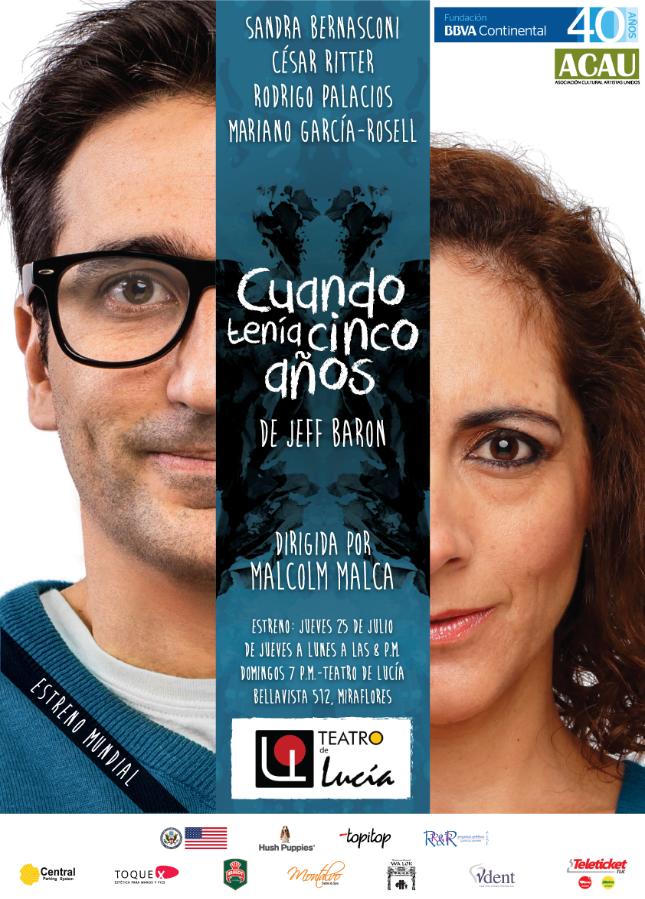
For the text of this review in both English and Spanish, click relevant tab.
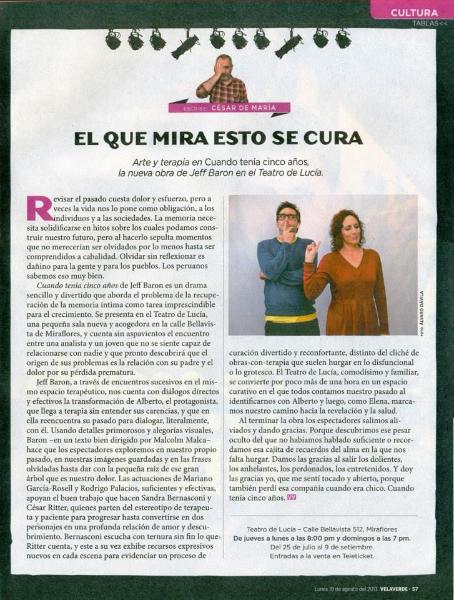
That Which You Can Face, Heals You
Art and therapy in Jeff Baron’s When I Was Five at Teatro de Lucía
To review the past takes pain and effort, but sometimes life makes this an obligation, for both individuals and societies. Memory needs to solidify into milestones on which we can build our future, but in doing so, we bury moments that do not deserve to be forgotten until we fully understand them. To forget without examining these moments is harmful for both individuals and for nations. Peruvians know this very well.
When I Was Five by Jeff Baron is a simple and entertaining drama that tackles the problem of recovering personal memory, a task that is essential for growth. Presented at Teatro de Lucia, a small and cozy new theatre on Bellavista street in Miraflores, it tells the story of the encounter between a woman therapist and a young man who is struggling with relationships. He soon discovers that the source of his problems is his relationship with his father and the pain of his untimely loss.
Jeff Baron, through a series of therapy sessions, using direct and effective dialogue, shows us the transformation of Alberto, the protagonist, who comes to therapy without understanding his problems. Alberto reunites with himself in the past, literally. Using exquisite detail and visual allegories, Baron – in a text well directed by Malcolm Malca – makes viewers explore our own past, our stored pictures and forgotten phrases, until we find the tiny root of the giant tree that is our pain.
The effective performances of Mariano Garcia-Rosell and Rodrigo Palacios, support the fine work by Sandra Bernasconi and César Ritter, who depart from the stereotype of therapist and patient to progress to two characters in a deep relationship full of love and discovery. Bernasconi listens tenderly and patiently to everything Ritter tells her, showing new and expressive resources in each session, showing a healing process that is both entertaining and rewarding, avoiding the clichés where therapy in plays and movies often focuses on the dysfunctional or grotesque.
Teatro de Lucía, which is very comfortable and familiar, becomes for more than an hour, a healing space, in which we can all use our own past to identify with Alberto, and then with Elena, as we make our way to revelation and health.
At the end of the play, the audience leaves feeling relieved and thankful. Because we discover our hidden sorrow, that which we have not spoken about, the secret box of memories in which we need to dig. As we leave, we give thanks, we the mourners, the longing, the forgiven, the entertained. And I give thanks, feeling touched and open, because I also had a loss as a child. When I was five.
– César de María – Revista Velaverde
El que mira esto se cura
Arte y terapia en Cuando Tenía Cinco Años de Jeff Baron en el Teatro de Lucía
Revisar el pasado cuesta dolor y esfuerzo, pero a veces la vida nos lo pone como obligación, a los individuos y a las sociedades. La memoria necesita solidificarse en hitos sobre los cuales podamos construir nuestro futuro, pero al hacerlo sepulta momentos que no merecerían ser olvidados por lo menos hasta ser comprendidos a cabalidad. Olvidar sin reflexionar es dañino para la gente y para los pueblos. Los peruanos sabemos eso muy bien.
Cuando Tenia Cinco Años de Jeff Baron es un drama sencillo y divertido que aborda el problema de la recuperación de la memoria intima como tarea imprescindible para el crecimiento. Se presenta en el Teatro de Lucía, una pequeña sala nueva y acogedora en la calle Bellavista de Miraflores, y cuenta sin aspavientos el encuentro entre una analista y un joven que no se siente capaz de relacionarse con nadie y que pronto descubrirá que el origen de sus problemas es la relación con su padre y el dolor por su pérdida prematura.
Jeff Baron, a través de encuentros sucesivos en el mismo espacio terapéutico, nos cuenta con diálogos directos y efectivos la transformación de Alberto, el protagonista, que llega a terapia sin entender sus carencias, y que en ella reencuentra su pasado para dialogar, literalmente, con él. Usando detalles primorosos y alegorías visuales, Baron – en un texto bien dirigido por Malcolm Malca – hace que los espectadores exploremos en nuestro propio pasado, en nuestras imágenes guardadas y en las frases olvidadas hasta dar con la pequeña raíz de ese gran árbol que es nuestro dolor.
Las actuaciones de Mariano García-Rosell y Rodrigo Palacios, suficientes y efectivas, apoyan el buen trabajo que hacen Sandra Bernasconi y César Ritter, quienes parten del estereotipo de terapeuta y paciente para progresar hasta convertirse en dos personajes en una profunda relación de amor y descubrimiento. Bernasconi escucha con ternura sin fin lo que Ritter cuenta, y este a su vez exhibe recursos expresivos nuevos en cada escena para evidenciar un proceso de curación divertido y reconfortante, distinto del cliché de obras- con-terapia que suelen hurgar en lo disfuncional o lo grotesco.
El Teatro de Lucía, comodísimo y familar se convierte por poco más de una hora en un espacio curativo en el que todos contamos nuestro pasado al identificarnos con Alberto y luego, como Elena, marcamos nuestro camino hacia la revelación y la salud.
Al terminar la obra los espectadores salimos aliviados y dando gracias. Porque descubrimos ese pesar oculto del que no habíamos hablado suficiente o recordamos esa cajita de recuerdos del alma en la que nos falta hurgar. Damos las gracias al salir los dolientes, los anhelantes, los perdonados, los entretenidos. Y doy las gracias yo, que me sentí tocado y abierto, porque también perdí esa compañía cuando era chico. Cuando tenía cinco años.
– César de María – Revista Velaverde
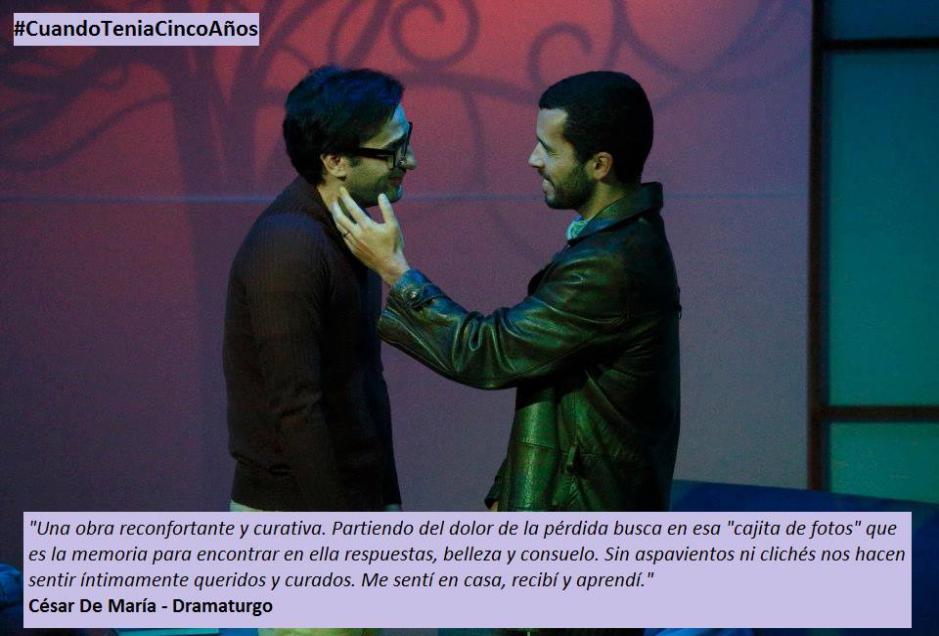
” A heartwarming and healing work. Starting from the pain of loss, it looks in the box of photos that is memory to find answers, beauty and comfort. With neither fuss nor cliche we are made to feel initmately loved and cured. I felt at home, I felt accepted and I learned.” – César De María
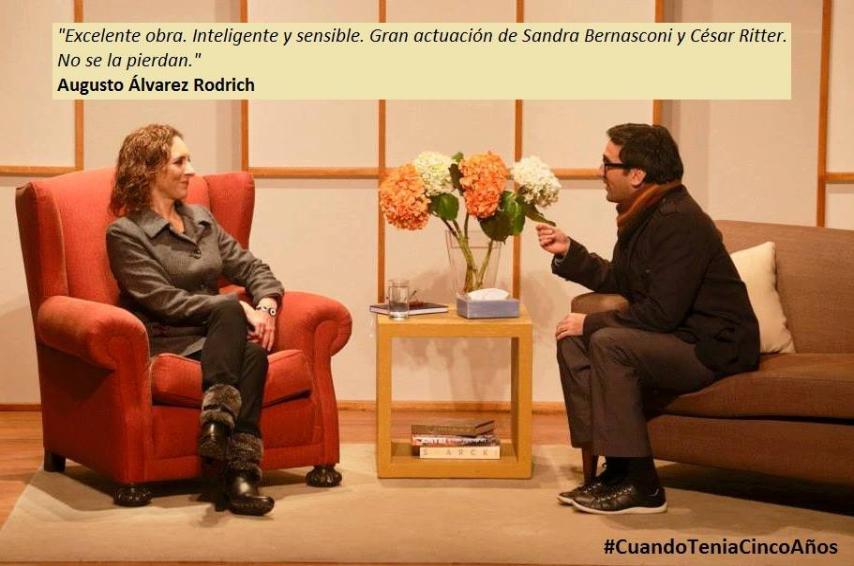
“Excellent play. Great performances by Sandra Bernasconi and César Ritter. Don’t miss it.” – Augusto Alvarez Rodrich
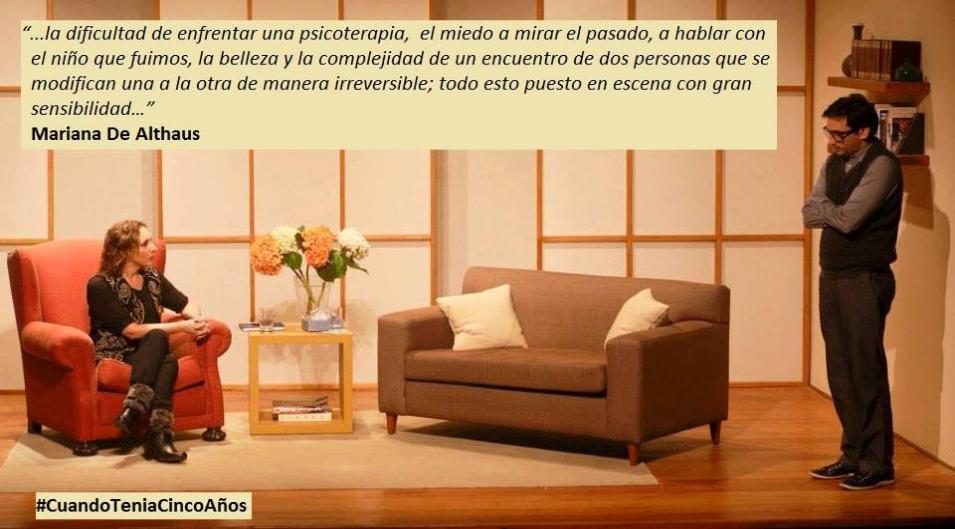
“… the difficulty of facing a psychotherapist, the fear of looking at the past, talking to the child we once were, the beauty and complexity of two people who change each other in an irreversible way; all this is staged with great sensitivity.” – Mariana de Althaus
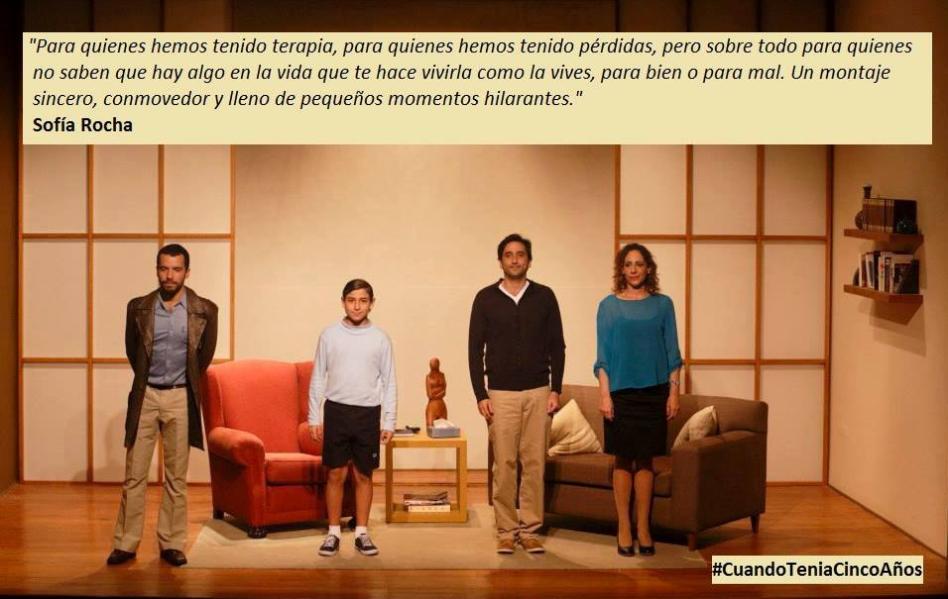
“For those of us who have had therapy, for those of us who have had losses, but especially for those who do not know that there is something in life that makes you live the way you live, for better or for worse. An honest, moving production full of small hilarious moments.” – Sofia Rocha
Escenografía
Illuminación
Musicalización
Vestuario
Fotografía
Diseño gráfico
Prensa
Producción ejecutiva
Producción general
Asistencia de dirección
Operación-luces y sonido
Jefatura de escena
Jefatura de sala
Carlos Mesta
Rolando Muñoz
José Barcenas
Gonzalo Tuesta
Álvaro Dávila
Pietro Hadzich
V y V Comunicaciones
Juan José Espinoza
Asociación Cultural Artes Unidos
Gonzalo Tuesta
Gisele Buller
Sebastián Gordillo
Erick Aguirre